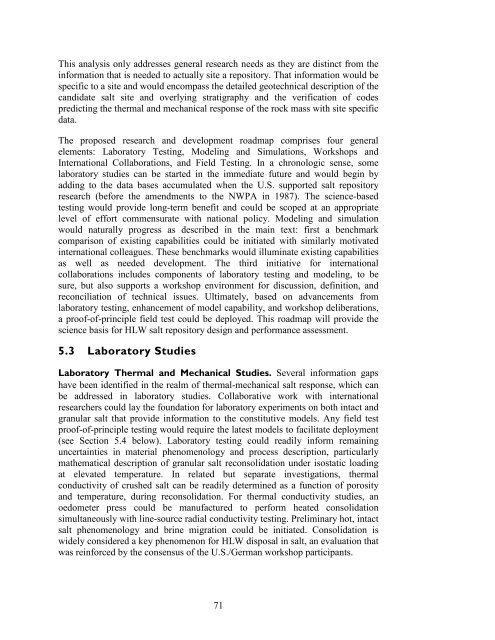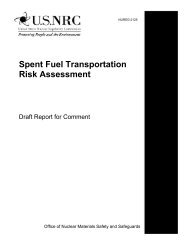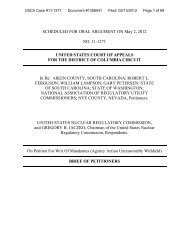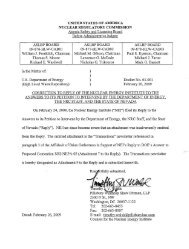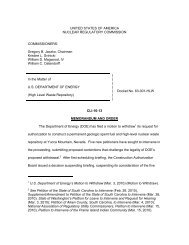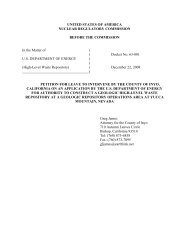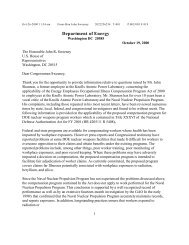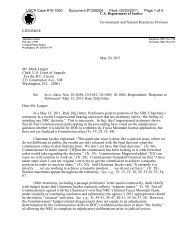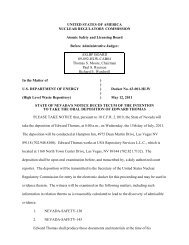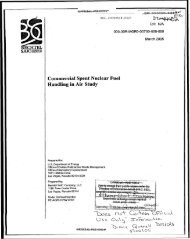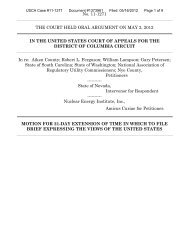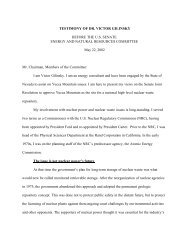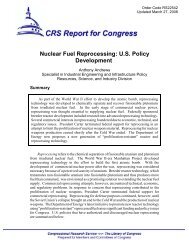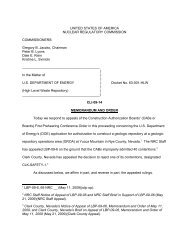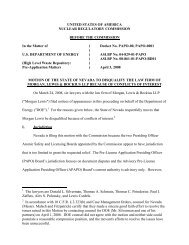Salt Disposal of Heat-Generating Nuclear Waste
Salt Disposal of Heat-Generating Nuclear Waste
Salt Disposal of Heat-Generating Nuclear Waste
You also want an ePaper? Increase the reach of your titles
YUMPU automatically turns print PDFs into web optimized ePapers that Google loves.
This analysis only addresses general research needs as they are distinct from the<br />
information that is needed to actually site a repository. That information would be<br />
specific to a site and would encompass the detailed geotechnical description <strong>of</strong> the<br />
candidate salt site and overlying stratigraphy and the verification <strong>of</strong> codes<br />
predicting the thermal and mechanical response <strong>of</strong> the rock mass with site specific<br />
data.<br />
The proposed research and development roadmap comprises four general<br />
elements: Laboratory Testing, Modeling and Simulations, Workshops and<br />
International Collaborations, and Field Testing. In a chronologic sense, some<br />
laboratory studies can be started in the immediate future and would begin by<br />
adding to the data bases accumulated when the U.S. supported salt repository<br />
research (before the amendments to the NWPA in 1987). The science-based<br />
testing would provide long-term benefit and could be scoped at an appropriate<br />
level <strong>of</strong> effort commensurate with national policy. Modeling and simulation<br />
would naturally progress as described in the main text: first a benchmark<br />
comparison <strong>of</strong> existing capabilities could be initiated with similarly motivated<br />
international colleagues. These benchmarks would illuminate existing capabilities<br />
as well as needed development. The third initiative for international<br />
collaborations includes components <strong>of</strong> laboratory testing and modeling, to be<br />
sure, but also supports a workshop environment for discussion, definition, and<br />
reconciliation <strong>of</strong> technical issues. Ultimately, based on advancements from<br />
laboratory testing, enhancement <strong>of</strong> model capability, and workshop deliberations,<br />
a pro<strong>of</strong>-<strong>of</strong>-principle field test could be deployed. This roadmap will provide the<br />
science basis for HLW salt repository design and performance assessment.<br />
5.3 Laboratory Studies<br />
Laboratory Thermal and Mechanical Studies. Several information gaps<br />
have been identified in the realm <strong>of</strong> thermal-mechanical salt response, which can<br />
be addressed in laboratory studies. Collaborative work with international<br />
researchers could lay the foundation for laboratory experiments on both intact and<br />
granular salt that provide information to the constitutive models. Any field test<br />
pro<strong>of</strong>-<strong>of</strong>-principle testing would require the latest models to facilitate deployment<br />
(see Section 5.4 below). Laboratory testing could readily inform remaining<br />
uncertainties in material phenomenology and process description, particularly<br />
mathematical description <strong>of</strong> granular salt reconsolidation under isostatic loading<br />
at elevated temperature. In related but separate investigations, thermal<br />
conductivity <strong>of</strong> crushed salt can be readily determined as a function <strong>of</strong> porosity<br />
and temperature, during reconsolidation. For thermal conductivity studies, an<br />
oedometer press could be manufactured to perform heated consolidation<br />
simultaneously with line-source radial conductivity testing. Preliminary hot, intact<br />
salt phenomenology and brine migration could be initiated. Consolidation is<br />
widely considered a key phenomenon for HLW disposal in salt, an evaluation that<br />
was reinforced by the consensus <strong>of</strong> the U.S./German workshop participants.<br />
71


